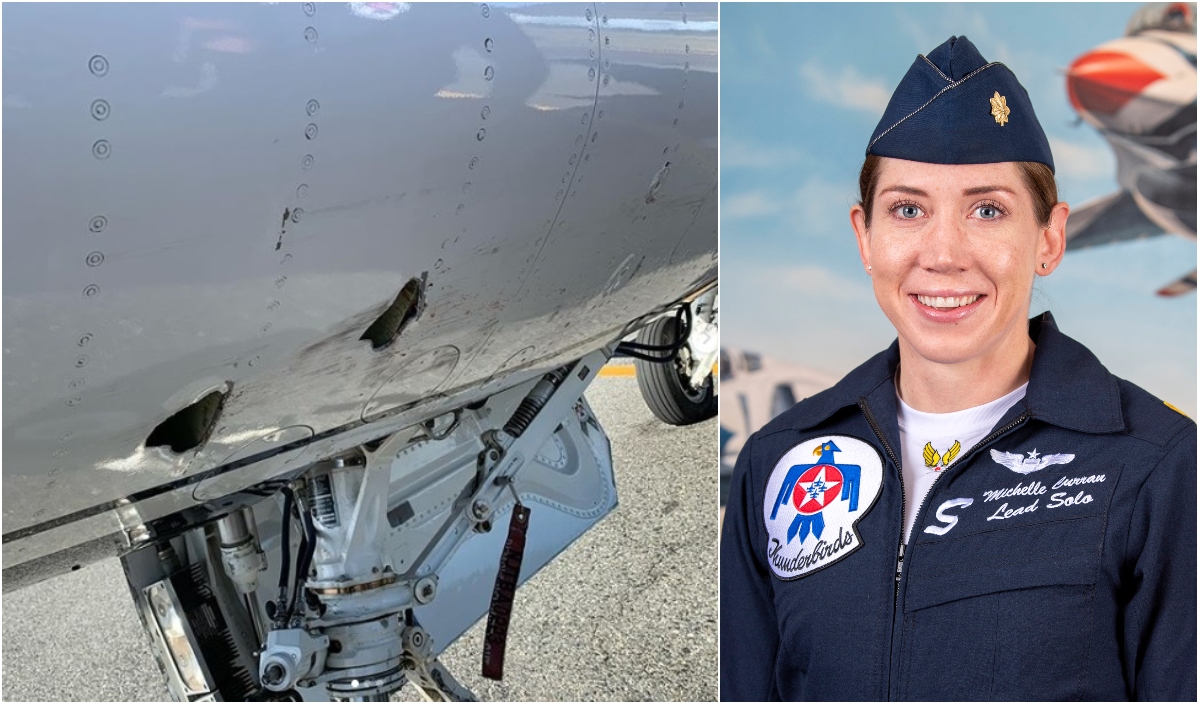5 Life-Changing Lessons I Learned From a Thunderbird Pilot Who Almost Died
July 26th, 2024

I recently sat down with a former US Air Force Fighter Pilot who almost died on the job MULTIPLE times. During the discussion I learned five lessons that changed my life and I knew I had to share them with others.
Michelle Curran is a former US Air Force Fighter Pilot and Thunderbird. She served for 13 years where she flew over 1500 flight hours with the Air Force. During her time flying, she had a number of insanely close calls, and the lessons she learned from them are worth hearing regardless of your career and if you fly planes or not.
Lesson #1: Things will always go wrong… How you react to those things could be the difference between life and death.
Michelle told me about two of the really close calls she had while she was on the Thunderbirds.
The first one, she hit a vulture while she was flying over Colombia.
This is a bird that can have up to a 5-foot wingspan, and for those not familiar with fighter jets like myself, they only have one engine air intake…
Fortunately, in her case, it only hit the edge of her intake, but the vulture put two holes in her plane.
If it had been just a bit further to the side and hit the intake straight on, she might have had to eject.
This actually happened to a different pilot a few years ago, and they barely survived, fortunately, they ejected just in time.

The second close call Michelle had was during an air show as a Thunderbird. She was performing a maneuver where two planes cross over each other so closely that it looks like they’re going to collide. And to make it more complicated, one of the planes is actually upside down.
Michelle goes on to talk about the key lessons with these close calls. You may not be flying a fighter jet, but there will always be things that go wrong that are out of your control. Here are the four steps or lessons for what you need to do:
- Practice, practice, practice: Repetition and the reflexes you learn through practice can save you in these situations. As Michelle says, “Your skill level catches up.”
- Maintain control: In her case, keep flying.
- Pause and analyze the situation: Even if the bird hit the engine, the plane would still glide and she could eject herself.
- Take proper action: Again, if you’ve prepared for every possibility, there should always be a next step you have in mind.
There’s another reason why practice and repetition are so important.
The bravest people– like Michelle– aren’t fearless, they just have the will to face their fears. And Michelle says practice is what helps her get to a point where she can do it even when she is scared.
Check out the picture of the bird here:

Lesson #2: Debrief your projects with your team and be open to feedback.
One of the most crucial parts of the practice and repetition Michelle is so adamant about is review. She says that as a fighter pilot, she would often fly a mission and then spend four times that amount of time debriefing that mission.
One of the things that personally stood out to me about these debriefs is that everyone enthusiastically accepts feedback from all levels and positions.
Both people who are superior to you AND below you. I know this can be a difficult thing to accept, but it is key to building high-functioning teams. By including and listening to everyone in the conversation, you are able to gain fresh perspectives and learn from everyone.
Lesson #3: You deserve to be where you are, even if you might not feel as talented or worthy as others believe. Don’t doubt your own skills and abilities.
Michelle talked to me quite a bit about Imposter Syndrome. For those that don’t know, Imposter Syndrome is the inability to believe that your success is deserved or has been achieved as a result of your efforts. And Michelle deals with this feeling often.
Michelle had to deal with Imposter Syndrome after she was accepted to become a fighter pilot.
Maybe you don’t feel the confidence in yourself that you can do it or belong there, or maybe your strengths show up differently than others in your cohort.
It’s interesting to hear someone as successful as her talk about feeling that she isn’t good enough. But to be fair I can relate to this sometimes, and maybe you can too. As the CEO of my company with no “formal” CEO training, some days it’s hard to keep those thoughts of doubt out of my head. But the key she talks about is recognizing that you aren’t alone with these feelings, and don’t be afraid to be vulnerable and talk about it with others.

Lesson #4: The odds of achieving your dream might be low… but go for it anyway.
Michelle told me about a time when she was in training with her class.
The odds of becoming a fighter pilot are extremely low – first you need 20/20 vision, which eliminates around 70% of people and then if you do get in, usually only one or two students from a class of 25 get picked to go to actual fighter pilot training. And as a woman, her odds were even lower. Up until 30 years ago, women were not even allowed to be fighter pilots in the US military.
Even today, only 3% of Air Force fighter pilots are women, so the change is happening, but slowly. I can see why it was once a faraway dream for Michelle.
But just because it may be a low chance, doesn’t mean it’s impossible. After one of her training flights, one of her instructors gave her a piece of advice that changed her life. This positive advice didn’t make her cocky or overconfident. That isn’t the demeanor or work ethic of a fighter pilot. Instead, it pushed her to keep putting the work in. That is the attitude you need to have if you want to be successful.
And this attitude has paid off for Michelle and all the young girls she inspires today. Because of Michelle’s work as a fighter pilot and her advocacy for women in the Air Force, she has been able to inspire countless young girls, especially during Thunderbird shows.

Lesson #5: Don’t join a team you don’t trust and respect.
The military is one of the most coordinated organizations in the world. It’s one of the most advanced examples of teamwork you can find. People have to work together…because there are lives on the line.
You need to make sure that you earn the trust and respect of your teammates. And it would be impossible for you to perform at a high level when you don’t trust your team yourself.
One last close call… Michelle’s first high-stakes mission was in Afghanistan. Her wingman unexpectedly had to refuel, leaving her alone in a high-risk situation. In seconds, she had to connect via radio to a person she had never met and follow their instructions. Without the coordination and trust of teamwork, she wouldn’t have been able to complete the mission.
Thank you for reading this article! By learning these five lessons, people can achieve success in their career and ambitions. Michelle is truly the best to learn from about overcoming fear and realizing dreams, so if you want to be successful, go study her.
And if you’re new here, make sure to follow me on Instagram at @motiversityceo
Sources:
https://www.linkedin.com/pulse/its-bird-plane-michelle-mace-curran/
https://theaviationist.com/2021/10/27/michelle-mace-curran-leaves-team/
Similar news
-

How Pixar Manages 1000 Employees In A Billion Dollar Creative Company
Pixar is not just an animation studio—it’s a storytelling powerhouse and a blockbuster-produc...Continue reading. -

3 of the Greatest Motivational Speeches Ever Created
I’ve listened to over 100,000 motivational speeches… These are three of the very best! When I ...Continue reading. -
 Continue reading.
Continue reading.COMING SOON
-
 Continue reading.
Continue reading.COMING SOON